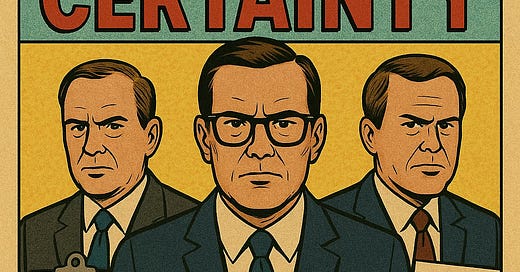Slides, Slogans, and Surveys: The Silent Tools Killing Your Company from Within
What Leaders Miss When They Trade Judgment for Optics
When the fire starts, they call the decorator.
The numbers are missing. The heat rises, and confidence wavers. But instead of facing the fire, leadership decorates the smoke.
They call in consultants, not cognitive warriors and thinkers. Decorators. And they bring one product: certainty.
They wear suits that cost more than your severance package and smile like they've never risked a real decision. They don't study your organization. They don't wrestle with your contradictions. They show up to present the illusion of control—already packaged, already trademarked, already priced.
These are The Merchants of Certainty.
Every Merchant travels with the same toolkit—ritual weapons used to neutralize ambiguity and suppress orientation. I call it the Triple-S Arsenal:
Slides – Diagrams of false clarity. Frameworks without friction. Motion with no gravity.
Slogans – Sanitized, repeatable mantras that make decay feel like improvement. "People First." "Culture Eats Strategy." "Agile at Scale." All hollow. All safe.
Surveys – Digitized approval rituals. Quantified nothingness disguised as insight. Institutional consensus theater is engineered to avoid honest feedback.
That's all they have. Slides. Slogans. Surveys. And somehow, it “works.”
Because these tools and templates are seductive. They create the feeling of progress. They simulate control. They signal professionalism. And they shield the institution from what it fears most: confrontation with what's actually happening.
Every slide distances you from what matters. Every slogan smothers dissent. Every survey reframes confusion as consensus.
Certainty is a narcotic. And the Merchants Of Certainty are licensed dealers.
They don't solve problems. They reframe them until they fit the templates they already brought.
They never say, "We need to stop and think." They say, "Here's the next step on the roadmap." Your roadmap. Their map.
But your terrain? It's long gone. Flattened. Abstracted. Replaced by a templated theater of transformation.
The Merchants Of Certainty don’t believe in your people, your culture, or your uniqueness. They believe in control, delivered quarterly, formatted in approved fonts, and validated by QR code.
And they never act alone. They are summoned by insiders who no longer want truth, only optics.
These are the Guardians of Decay.
The Guardians Of Decay don't fear failure. They fear uncertainty. They fear friction. They fear the one thing they can't stage-manage: honest confrontation with what's real.
So they bring in the Merchants Of Certainty. To justify layoffs as "streamlining." To translate entropy into "alignment." To package indecision as "agility."
Together, they perform a ritual of change that never threatens the structure of power.
The Guardians of Decay retain control. The Merchants of Certainty retain the retainer. Maybe they bring in an approved celebrity speaker or best selling author to “reinforce the mission,” but really just sell more books. And everyone left learns to speak in decks, not decisions.
By the time they're done, your organization will look more polished on the surface. There will be slogans on the walls. Dashboards on screens. Committees with names that sound like strategy.
But underneath? Judgment is gone. Curiosity and innovation are punished. Conflict is professionalized out of existence. Language has been replaced by marketing.
You'll see movement. But no maneuver. You'll hear words. But no meaning. You'll feel busy. But never clear. Because orientation has been sacrificed for the feeling of momentum.
The Merchants Of Certainty won't fix it with another playbook. You can't slide your way out. You must refuse.
Refuse the deck that pretends to know your business better than your people do. Refuse the slogan that collapses your culture into a catchphrase. Refuse the survey that trades judgment for statistical theater.
Reorientation begins when you say:
"No. We will not outsource our thinking. We will not buy clarity in bulk. We will earn it through confrontation, friction, and truth."
The greatest lie the Merchant ever sold is that strategy is a product.
It's not.
Strategy is a mental tapestry.1 It is living weave of changing intentions used to harmonize and focus action amid an unfolding, often chaotic world. It demands human judgment, because in a landscape of bewildering events and contending interests, no algorithm, framework, or outside firm can see what must be seen or decide what must be done.
So if you're tempted to hire the next decksmith and spreadsheet engineer who promises clarity, ask yourself: Are you trying to reorient, or escape the cost of leadership?
Because you will pay either way.
One path leads to discomfort and survival. The other is to a polished and slow institutional death.
Choose wisely.
We will have a lot more on this to discuss.
John Boyd, The Strategic Game of ? and ?: “What is strategy? A mental tapestry of changing intentions for harmonizing and focusing our efforts as a basis for realizing some aim or purpose in an unfolding and often unforeseen world of many bewildering events and many contending interests.”








The Merchants of Certainty employ the Homogenization of Thought.